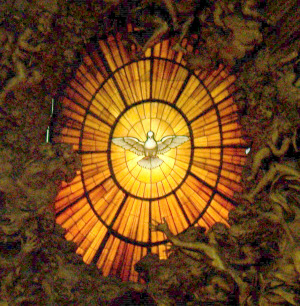
 o, last week, I was complaining about having a difficult time coming up with a topic. This week I’m going to tackle something about which a doctoral dissertation could be based. How ambitious. I attempt to give some bare-bones basics. A friend asked me this past week about epiclesis, and I remembered how many times I was in graduate school, learning something about the liturgy, when I asked myself “Why doesn’t everyone learn about this stuff?” My specific studies were so spiritually enriching that I wish everyone could experience them, however small they were.
o, last week, I was complaining about having a difficult time coming up with a topic. This week I’m going to tackle something about which a doctoral dissertation could be based. How ambitious. I attempt to give some bare-bones basics. A friend asked me this past week about epiclesis, and I remembered how many times I was in graduate school, learning something about the liturgy, when I asked myself “Why doesn’t everyone learn about this stuff?” My specific studies were so spiritually enriching that I wish everyone could experience them, however small they were.
Epiclesis is the invocation of the Holy Spirit upon the bread and wine, implicitly or explicitly, in the Eucharistic Prayer. In the Orthodox churches, the epiclesis completes the consecration. In Catholic theology, the Words of Institution (or anamnesis, for those of you starved for Greek terms) are consecratory. In our (Roman Catholic) Eucharistic Prayers, the epiclesis is “split,” occurring both before and after the consecration.
When I was in graduate school, a small group of us went out in the dead of night to grab some fast food to break up the studying. I drove. After going through the drive-through, I asked my friend in the back seat to pass me my drink. He said, “Preparing to pass the soda.” Pause. “Passing the soda.” I asked him what in the world that was. He was an Army major and explained that in military operations, you would frequently give a command of preparation immediately prior to the command of execution. It worked; I was ready to receive the drink instead of clumsily spilling it into my lap (which is more than likely what I would have done absent the warning).
Similar to this preparatory command is the epiclesis in the Eucharistic Prayers. In the Roman Canon (Eucharistic Prayer I), the first portion of the epiclesis is implicit with the words:
Be pleased, O God, we pray, to bless, acknowledge, and approve this offering in every respect; make it spiritual and acceptable, so that it may become for us the Body and Blood of your most beloved Son, our Lord Jesus Christ.
These words themselves are not consecratory; the Words of Institution that follow them are. The epiclesis is the “command of preparation” before the executing “command of execution.” It’s an imperfect analogy, but we’re talking about miracles, here. Work with me.
The epiclesis (epicleses? epicleses’s?) in Eucharistic Prayers II, III, and IV are much easier to identify; they explicitly invoke the Holy Spirit. For example, in EP II:
Make holy, therefore, these gifts, we pray by sending down your Spirit upon them like the dewfall, so that they may become for us the Body and Blood of our Lord Jesus Christ.
Very clear. There is also an epiclesis of sorts after the consecration. It is the prayer by which we ask the Holy Spirit to unify the faithful by their participation in this sacrament. Again, in the Roman Canon this is implicit:
In humble prayer we ask you, almighty God: command that these gifts be borne by the hands of your holy Angel to your altar on high in the sight of your divine majesty, so that all of us, who through this participation at the altar receive the most holy Body and Blood of your Son, may be filled with every grace and heavenly blessing. (Through Christ our Lord. Amen.)
While in the other Eucharistic Prayers this is explicit, for example in EP III:
Look, we pray, upon the oblation of your Church and, recognising the sacrificial Victim by whose death you willed to reconcile us to yourself, grant that we, who are nourished by the Body and Blood of your Son and filled with his Holy Spirit, may become one body, one spirit in Christ.
This “second epiclesis” is always oriented toward the unity of the Faithful. This culminates with the Doxology (Through Him, with Him, and in Him…in the unity of the Holy Spirit…), which in the Roman Canon is the only explicit mention of Holy Spirit.
We see that the epiclesis is the request for the Holy Spirit’s intercession in the Eucharistic Prayer, first to sanctify the gifts of bread and wine, and then to sanctify the gifts of the faithful. This makes special sense in that the sanctification of the faithful is one of the primary goals of the Eucharist.
This concludes this week’s session of Andy’s Ten Minute Liturgical Theology. I’m sure I have left something out or mis-phrased something that makes me look like a heretic, so do the web-thing and correct me in the comments. Thanks, and be sure to tune in next time!
